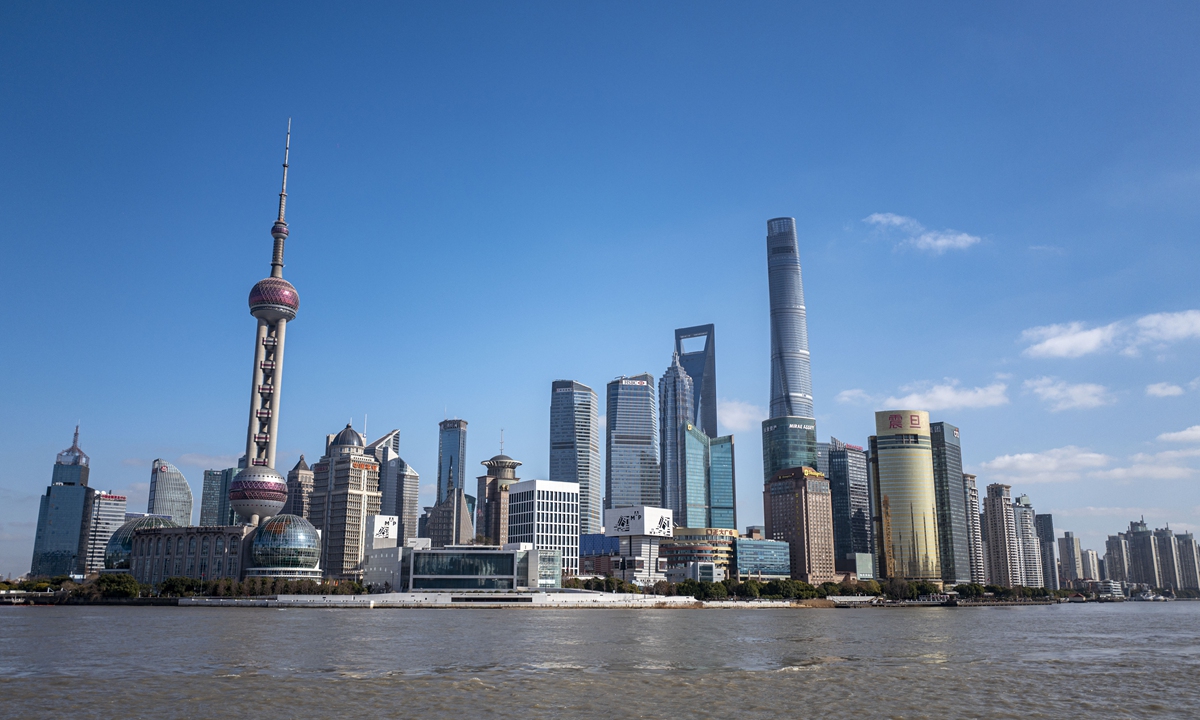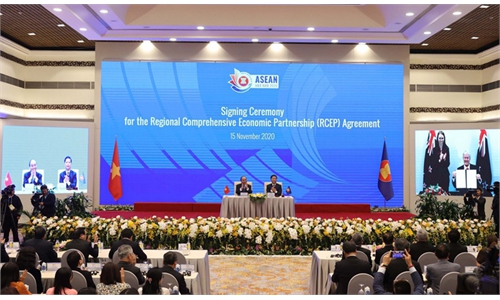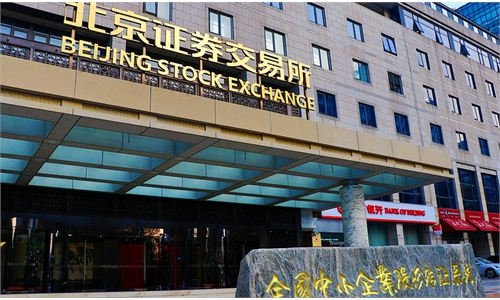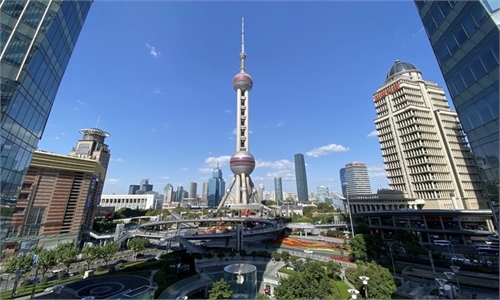China speeds up approving mutual funds wholly owned by overseas capital to further open $3.9 trillion market
Trend offers fine mid- and long-term investment opportunities


A view of Shanghai's Lujiazui financial district Photo: VCG
Editor's Note:
China has downgraded its COVID-19 management from a Class A to Class B infectious disease, and reopened its borders. In recent months, a growing number of foreign financial institutions have sped up moves for a bigger share of control of China's mutual fund market as China's growth outlook brightens.
This is the fourth installment in a series on how China's optimization of its anti-COVID strategy is expected to help secure the future and brighten outlooks in the world's second-largest economy.
The family of mutual funds in China wholly owned by overseas capital has seen an expansion, showcasing rising confidence by foreign financial institutions in this submarket, as China's economic outlook, including high-quality growth, high-level opening up, and low carbon and green development, offers fine mid- and long-term investment opportunities, industry insiders have said.
In the latest development, New York-headquartered private Equity Firm Warburg Pincus is buying up stakes in ZO Asset Management, the Shanghai Securities News reported on Sunday, citing a China Securities Regulatory Commission (CSRC) filing. If approved, it would be Warburg Pincus' second equity buy in a Chinese mutual fund company, underlining a profound interest by foreign financial institutions in China's mutual funds.
Aside from equity buys, in less than three months, a total of four mutual fund companies have become wholly owned by foreign financial institutions, through the setting up of new subsidiaries or a reshuffle of those in charge of the organizations, according to industry site chinafund.com. The change has outweighed what's been accomplished in the last two years, the report said.
The category of wholly foreign-owned mutual funds in China welcomed a new member on February 3 - famed Wall Street investment bank Morgan Stanley as China speeds up approving overseas financial institutions to swim in China's $3.9 trillion asset management market.
The company's asset management unit Morgan Stanley Investment Management announced that it has received approval from China's securities watchdog CSRC for Morgan Stanley Investment Management to take full ownership of a China mutual fund venture, according to a statement published on the company's official WeChat account on February 6.
According to the statement, Morgan Stanley Investment Management has increased its stake in Morgan Stanley Huaxin Funds from 49 percent to 100 percent, which the company said marks "breakthrough" progress in its strategic map in the Chinese market.
The announcement came just two weeks after JP Morgan, another well-known US financial services company, won a nod from the CSRC to buy out its China mutual fund venture.
With the regulatory approval, Morgan Stanley has become the seventh overseas global asset manager that wholly owns a mutual fund management firm in China, joining others like BlackRock and Schroders.
Gokul Laroia, CEO for Asia at Morgan Stanley, said the company sees long-term opportunities in China's assets management industry with high levels of wealth creation, growing demand for financial advice, and the launch of a private pension scheme in the country.
Dan Simkowitz, head of Investment Management at Morgan Stanley, added that the company will provide more diversified services for China's assets and wealth management market, and the Chinese market will also become an important pillar of the company's global investment management business growth.
Two-way selection
Experts said that overseas asset companies are elbowing their way into China's huge and increasingly burgeoning mutual fund market, which offers a shot at profitability regardless of stock price fluctuations.
According to a report by the Securities Daily, a total of 1,520 mutual funds were issued in China in 2022, raising capital totaling 1.48 trillion yuan ($218 billion), almost half of what was raised in 2021.
"The number or capital raising amount of domestic mutual funds will see a rising trend in the long run because a growing number of people are expected to invest in the domestic securities market," Xi Junyang, a professor at the Shanghai University of Finance and Economics, told the Global Times on Tuesday.
Yang Delong, chief economist at Shenzhen-based First Seafront Fund Management Co, said that dropping mutual fund issuance in 2022 was mainly a result of the impact of the coronavirus disease, which dragged down stock performance.
However, as stock markets are expected to rise again with a predicted economic recovery in 2023, mutual fund issuance is likely to "explode" again and become an important source of incremental capital in the securities market.
"China's mutual fund market has entered a period of rapid development. As the trend forms for domestic residents to shift capital from deposits into investment channels and as the real estate market's investment chances increase, China's mutual fund market will witness plenty of opportunities over the next few years," he told the Global Times.
However, Xi said that the speed of approval for global companies' entrance is a little slow in general since regulators scrapped foreign ownership restrictions in the industry in April 2022, although it has sped up a little in recent months as China moved to optimize coronavirus disease management measures.
"It's a matter of two-way selection. On the one hand, Chinese regulators are focusing on introducing overseas financial institutions with relatively robust and advanced management experience. On the other hand, overseas institutions also have concerns about whether they can issue funds smoothly in China, as the market is full of competition currently," Xi noted.
Previously, the regulator also approved Schroders, Fidelity International, and Neuberger Berman Group to set up wholly-owned new fund units.
Rising participation
Apart from mutual fund firms, overseas companies are also mounting efforts to set up wholly-owned companies in other financial sectors.
On February 3, Standard Chartered said it had been granted approval by the CSRC to set up a mainland securities firm, according to a statement sent by the company to the Global Times that day.
In the statement, the company said it was the first time that the CSRC has granted the establishment of a securities firm wholly owned by a foreign shareholder since ownership restrictions were scrapped three years ago.
The securities firm, headquartered in Beijing, would have an initial capital injection of 1.05 billion yuan and would cover businesses including asset management, underwriting, securities brokerage, and other activities.
Zhang Xiaolei, president of Standard Chartered Bank (China), said that with the sustained and accelerated opening-up of China's capital market at a high level, the company wants to provide more financial solutions for domestic and foreign companies/institutions that come in or out of China for investment.
Meanwhile, Munich-headquartered Allianz has also been approved by Chinese regulators to become the mainland's first wholly-owned foreign insurer.
According to Xi, the gradual approval of setting up financial institutions wholly owned by overseas capital is a natural result and is required for China's financial opening up.
"Introducing overseas institutions can create benign competition for domestic companies. In particular, domestic companies can learn from multinational financial firms in terms of their business mechanism via business contact or cooperation," Xi said.
He added that rising risk control abilities of domestic banks following the setup of foreign banks in China are a good example of how domestic financial institutions can learn from overseas financial multinationals.
On the other hand, overseas companies might clash with domestic partners in setting up joint ventures, particularly in terms of internal management, and setting up wholly owned firms provides them more leeway to tap mainland markets, Xi said.



